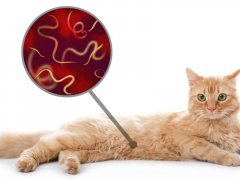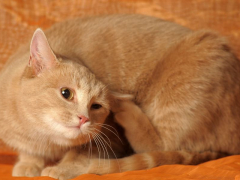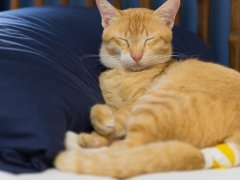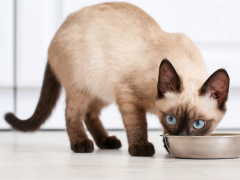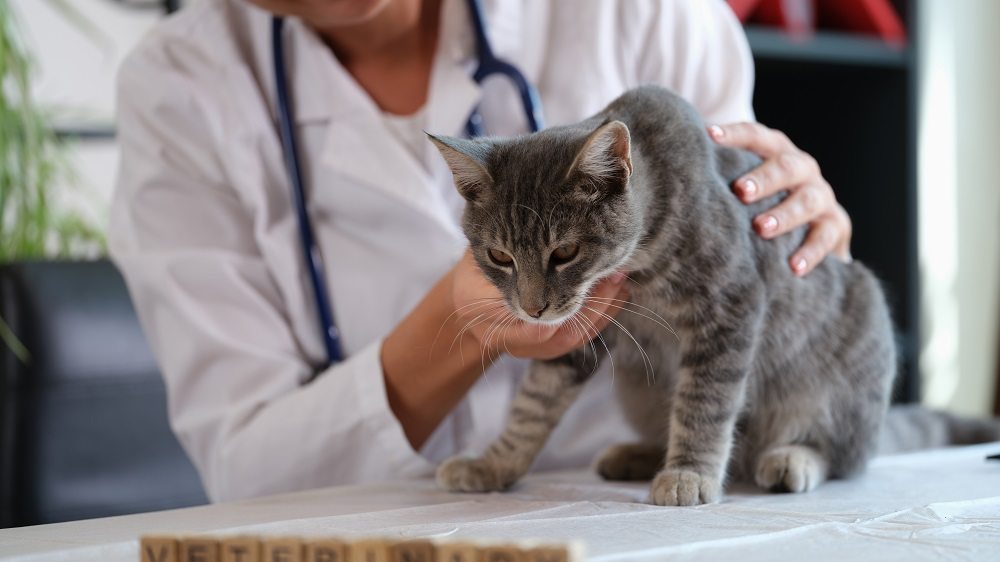
Coughing in cats usually indicates a health problem. If you hear your cat coughing, it’s time to schedule a visit to the veterinarian. Many different medical conditions can cause coughing in cats, some of which can be serious or contagious to other cats.
About Cat Coughing
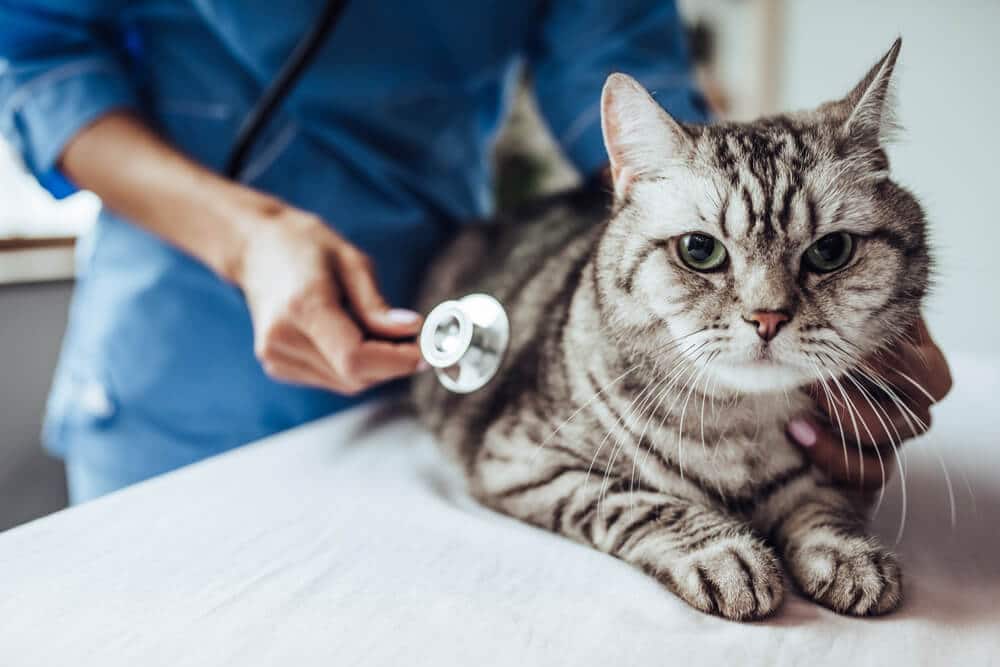
A cat coughing doesn’t always necessitate a trip to the vet, but in some cases, a vet visit may be essential. Your vet can help you to identify and resolve the underlying cause of your cat’s cough.
Since coughing is somewhat uncommon in cats, you might be wondering, what does cat coughing sound like? That can depend on the type of cough your cat has. Cat coughing can be wet (moist and phlegmy sounding) or dry (which may sound like hacking).
Coughing cats might sound like they are gagging or vomiting, and a coughing cat might even cough up a foamy substance that looks like vomit.
When a cat “coughs up” a hairball, she is actually vomiting. However, if a hairball becomes stuck on its way up and out of the esophagus, a cat might cough and hack and yack repeatedly in an attempt to expel it. If your cat produces a wad of hair, it’s likely the coughing is related to a hairball, especially if your cat doesn’t have any other symptoms.
A cat that’s vomiting can sometimes sound like they’re coughing, especially if there is a lot of gagging and hacking going on. If you find a puddle of bile or food (and not just clear foam), it’s likely your cat is vomiting rather than coughing.
Both vomiting and coughing warrant a visit to the veterinarian, especially if the cat is acting very sick (not eating, laying around, experiencing diarrhea, etc.).
Why Is My Cat Coughing?
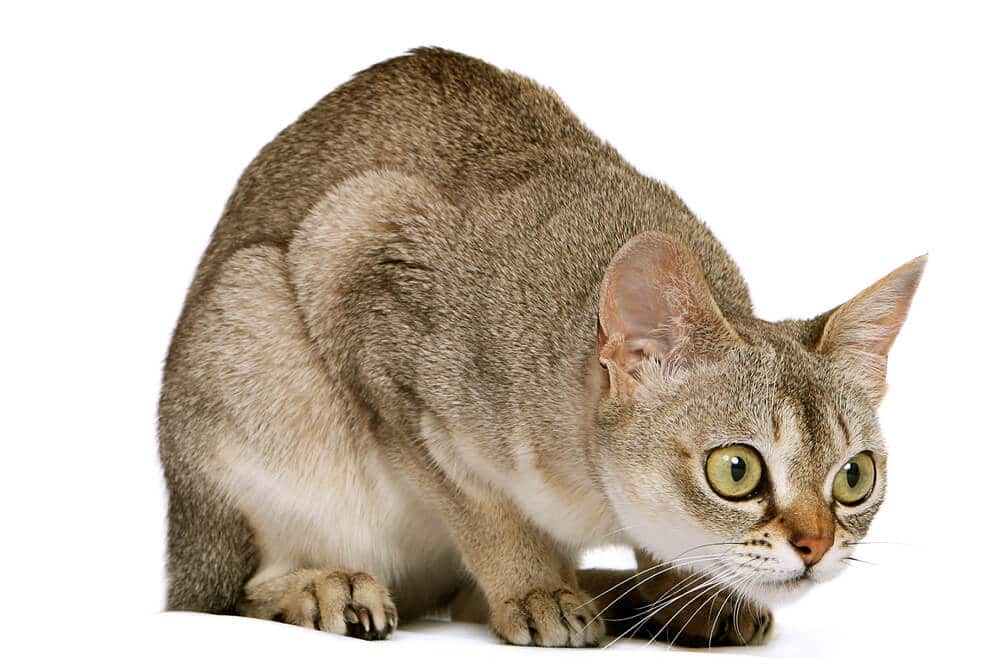
Like humans, cats may start coughing for a wide range of reasons.
Causes of coughing in cats vary. Some of the most common causes of coughing in cats include:
Allergies
Coughing in cats is frequently due to allergies. Cats can be allergic to many different substances, including air fresheners, irritants or chemicals in the home, cigarette smoke, dust from cat litter, mold, perfume, and pollen, among many other things.
Infection of the Upper or Lower Respiratory Tract
Viral or bacterial respiratory infections are quite common in cats, especially in cats that are housed in places with high numbers of cats, like shelters and catteries. Cats that are coughing due to an upper respiratory infection may also experience congestion, sneezing, runny nose, and decreased appetite.
Asthma
Feline asthma is a common cause of coughing in cats. Asthma can be triggered by many of the same things as allergies (see above). Cats that have asthma usually wheeze, in addition to coughing and possibly gagging. Asthma is a serious condition because it inhibits the cat’s breathing.
In fact, an asthma attack can be a medical emergency. If you see your cat coughing, wheezing or breathing with her mouth open, or notice that your cat’s gums or tongue look blue or gray, bring your cat to a veterinarian immediately. Cats suffering from an asthma attack may also hunch low to the floor, stretching out their head and neck out as they attempt to breathe.
Bordetella
Feline bordetellosis, caused by the bacteria Bordetella bronchiseptica, is an extremely contagious disease that causes upper respiratory infections. It is more common in cats housed in animal shelters, pet stores, or breeding facilities. Very young kittens are especially susceptible.
Damage to the Trachea
If your cat’s collar is so tight that it squeezes on the trachea, or your cat suffers an injury to her trachea, she may cough.
Laryngitis
Laryngitis, or inflammation of the larynx, may cause coughing in cats. Cats that cough after eating or while they are eating might have a disease of the larynx or esophagus.
Foreign Body in the Airway
Cats sometimes inhale tiny bits of grass or seeds, or foreign object that irritate the airway, causing coughing.
Heart Disease
Coughing due to congestive heart failure is more common in dogs than cats, but cats may also cough when their heart function is diminished.
Lungworms
Lungworms are parasites that take up residence in the lungs, where they wreak havoc. They are a type of roundworm. In addition to coughing, symptoms of lungworm in cats include difficulty breathing and nasal discharge.
Heartworms
Although heartworms are less common in cats than dogs, cats can become infected with this parasite. Heartworms take up residence in the heart and pulmonary (lung) arteries, where they mature from little larvae to adults.
Heartworm disease in cats can be fatal, so using a monthly heartworm preventive is recommended, especially for outdoor cats or those living in areas where heartworms are abundant.
Lung Cancer
Coughing is one of the signs of lung cancer in cats, although many cats with lung cancer often display no symptoms.
Pneumonia (Lung Infection)
Pneumonia is an infection of the lungs that may be caused by a virus, bacteria, or fungus. Cats may suffer from pneumonia if they accidentally aspirate (inhale) liquid or food into the lungs.
What To Do if Your Cat Starts Coughing?
If you think your cat is coughing, pay attention to when she’s coughing, how often she’s coughing, and what the cough sounds like. Your veterinarian might ask you to describe the sound of the cough if your cat isn’t actively coughing when you bring her in for an exam. If you can, try to take a video of your cat coughing to show the veterinarian.
If your cat just coughs once or twice, and otherwise seems fine, you could watch her and see if the cough goes away on its own. Continuous coughing should be checked out by your vet, even if your cat is not coughing all day long.
Take your cat in right away if she seems to be having difficulty breathing (panting or wheezing) or is acting very sick (not eating, lethargic, experiencing discharge from the nose or eyes, vomiting, or having diarrhea).
The veterinarian will ask you a lot of questions about your cat’s cough and will conduct a complete physical exam. The vet might also want to run tests like blood work, urinalysis, x-rays, an ultrasound of the heart, or other tests. Treatment for cat coughing depends on the underlying cause of the cough and may entail supportive care, medications, lifestyle changes, or surgery.
Do Not Ignore Cat Coughing
Cats don’t typically cough, so if you hear your cat coughing, do not let it go. In some cases of cat coughing, quick treatment is necessary. Many causes of coughing in cats can be resolved with veterinary intervention.
